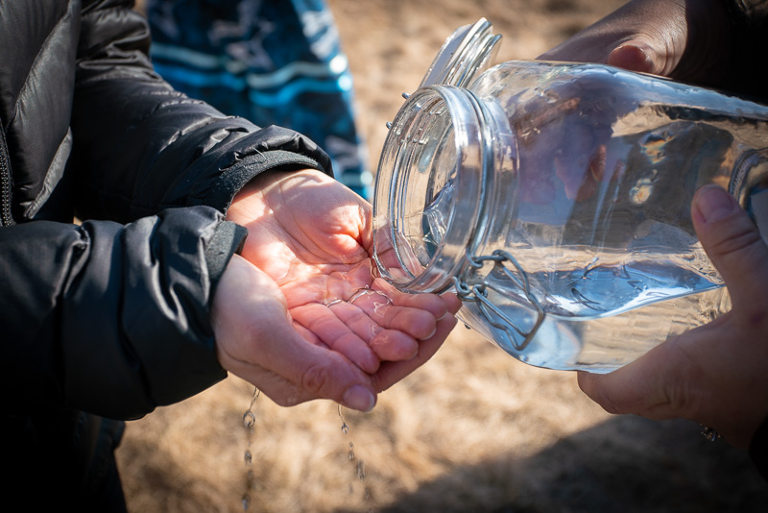There is a renewed push for researchers to work collaboratively across disciplines and cultures to address the problems related to climate change. While this push for inclusivity suggests diversity, in reality it perpetuates western colonial structures of knowledge and engagement with marginalized populations who are most impacted by environmental injustices and largely excluded from the processes that impact them 1, 2, 3. As fluid mixed-race Indigenous women, our racialized academic lived experiences are grounded in the historical legacy of who decides for whom the meaning of science and by this we are unapologetically confronting white, male status quo norms and privilege of Western Knowledges (WK). We began our academic journeys on different converging paths, a Historically Black College and University (HBCU), North Carolina Agricultural and Technical State University, and a Tribal College and University (TCU), Haskell Indian Nations University. The legacy to dismantle and decenter white discourse at HBCU’s and TCU’s gave us the necessary moral compass to ask, what does justice demand when building diverse academic alliances? So, the question becomes, how can we as individuals do convergence science to address climate justice across cultures and disciplines with Indigenous Peoples?
Both scholars are positioned to provide leadership in curricula planning and development for students, in particular Indigenous and other marginalized student advisement and retention, and both are immersed within communities as engaged, collaborative partners. People educated in Western institutions are largely unaware of HBCU’s and TCUs unique attributes in higher education and their history of confronting educational injustices. The issues at hand are the lack of ethical, equitable, and just values for collaborative and community engaged scholarship and discursive practices that place an emphasis on explicitly anti-racist pedagogies, practices, and production in teaching and research partnerships that work to advance racial justice, reconciliation, and repair of Indigenous Peoples.
Indigenous Knowledges (IK) are embedded in relationships to specific lands, cultures and communities. The misconceptions of IK often represent a static pan-Indigenous framework without acknowledging the interconnected responsibility of place-based knowledge. One of the major failures of WK has been the lack of attention and accountability to the long-term implications of knowledge practices such as natural resource extraction and the ideas around sustainability. On one hand, WK presents itself as singular and self-validating, while delegitimizing alternative knowledges and ways of knowing that challenge WK status quo systems of authority. On the other hand, the local, community context of IK is rooted in an intimate and on-going reciprocal, sustainable relationship and stewardship roles with the natural world. For example, a generational relationship with the environment would provide a historical context of accountability and understandings of the impacts of industrial capitalism 4. Then, how do Indigenous students navigate institutions that are structured to disregard generational relationships? What are the social, ethical and cultural considerations of IK for accountable Earth sciences and sustainability?
During the course of our graduate school experiences, we have felt displaced and invisible, as if our IK had no capital and our positionality as Indigenous women was devalued within the realm of Western science. From our perspective, white academic institutions represent mass acculturation, lessons about what it means to be colonized and who matters as students. A solution is to include the guiding philosophy of IKs as accountable and sustainable practices to place-based and generational responsibilities. For this reason, it is imperative to utilize Indigenous place-based, community driven science as the foundation of convergence science. The overall purpose is to provide a realistic perspective of the Indigenous world to view IK as guidance for not only Indigenous Peoples but also local, national, and international societies. Convergence science must act to decenter WK and empower marginalized communities as we strive for a comprehensive accounting in science.
Often, norms and values are drawn from institutional histories but lack historical accuracy. From an Eco-Critical Race Theory and 7 R’s of Indigenous research lens, both are methods and methodologies that sustain IK values to accurately convey the narratives of Indigenous Peoples 5-8. As institutions revise the representation of sciences, IK must take on an equal, if not primary role in history of place and mentoring our future leaders through convergence science. Though painful realities of exclusion may surface, institutions must seize the opportunity to embrace the neglected, appropriated, or erased contributions of Indigenous Peoples in these efforts. For instance, racialized bodies and disregard of sovereignty perpetuates racism, colonization, and forced assimilation. The unjust actions that disregard the historical and continual traumas of erasure of IK of place are concrete example of areas for improvement working with Indigenous and other marginalized communities. Forms of oppression occur when established laws, customs, and practices systematically reflect and produce inequities based on membership in targeted groups. Critical Race Theory (CRT) tenets reinforce the need for antiracist and anticolonial ideas and actions to be inclusive and support diversity 6-9.
Drawing on Montgomery’s experience as a mixed-race, Indigenous woman and Eco-Critical Race Theorist, she has adapted the six CRT tenets to serve as an important foundation to include counter settler-colonial narratives that recognize the eco-intersectionalities of identities and lived experiences as the following:
(1) Recognizes that environmental racism is endemic in Indigenous peoples lived experiences;
(2) Expresses skepticism toward dominant legal claims of a post-racial society; [respect]
(3) Challenges anthropocentric ecological ahistoricism and insists on a decolonized historical analysis;
(4) Insists on recognition of self-determination sustainability as living knowledge of Indigenous peoples and our communities of origin to analyze [settler-colonial] laws and policies;
(5) Indigenous knowledges are interdisciplinary with a collective responsibility;
(6) Works toward eliminating racial and environmental oppression of Indigenous peoples’ land and seascape identities as a part of the broader goal of ending all forms of oppression 6-9.
The adapted tenets pinpoint that standard narrative practices for who defines for whom the meanings and value of knowledges support race essentialist notions. For these reasons, institutional culture creates an inferior and superior perspective of not only race, but also policies, identities and genders. Race essentialist notions of research practices that inform polices reinforce intellectual stigmas through which institutions perceive one another as socioeconomic and political representations. Work that fuses Eco-CRT and 7R’s of Indigenous research seeks to liberate and provide a space to help understand prevalent inequities within WK, in particularly western science. By converging Indigenous methods and methodologies with mainstream language of western science, the 7 R’s framework can be used with place-based IK in ways that allows non-Indigenous peoples to better understand and work equitably across disciplines, cultures, and multiple ways of knowing and doing.

Kirkness and Barnhardt laid out 4 R’s of research with Indigenous Peoples; respect, relevance, reciprocity, and responsibility, as a set of foundational research ethics for others to build on providing a framework of research protocols that value Indigenous Peoples 5-6, 11. Blanchard adds three more; relatedness, relationships, and redistribution. These combined 7 R’s of Indigenous research as methods when utilized withing the framework of Eco-CRT and Indigenous methodologies, provide fluid practices that support, protect, and enhance IK. Indigenous Peoples have unique accountabilities with place that colonists, settler colonists, and even some immigrants do not understand, let alone have respect for. This lack of respect and accountabilities has left continuing legacies of environmental racism, human centric extractive and exploitive relationships, and systems grounded in capitalism, kleptocracy, and corporatocracy further destroying the ethics and justice for the care of place.
Convergence research is a concept in science that the National Science Foundation identified around 2016 to solve difficult social problems that requires “integrating knowledge, methods, and expertise from different disciplines…” to create “frameworks” to advance scientific “discoveries and innovations” across disciplines in what seems to be an attempt to either create “new” framework’s or “integrate” multiple knowledges and ways of knowing and doing into a “new framework” 10. This is another form of Western science’s consumption of other knowledges and forming one they can claim. This is problematic as when IK, being place specific, is homogenized into a one size fits all framework centered within the whitestream Eurocentric lens where diversity, equity, inclusion, and justice of place and the Peoples of place are erased and replaced 6, 11-17. This does not fully support IK as seen through the 7 R’s of Indigenous research and confirms the Eco-Critical Race challenges as supplied earlier in this document 5-6.
It is important to capitalize on the strength and resources of tribal communities and work toward the incorporation of such culturally supported involvements while at the same time working to adapt empirically supported interventions to make them culturally and spatially relevant and acceptable 11-17. An important component of the Eco CRT and 7R’s recommended approach is to identify strategies that offer alternatives to negative precedents, while empowering underserved tribal populations through team science research opportunities with a particular attention to the use of tribally-led research to address disparities and the needs of underserved Indigenous communities. An EcoCRT and 7R’s lens would build and is expected to contribute to the creation and dissemination of positive models of Indigenous science partnerships thus advancing collaborative knowledge and knowledge productions, especially as convergence science becomes more prevalent in environmental and climate research.
Citations
- Wildcat, D. R. (2013). Introduction: climate change and indigenous peoples of the USA. Climate Change and Indigenous Peoples in the United States, Springer: 1-7.
- Pulido, L. (2015). “Geographies of race and ethnicity I: White supremacy vs white privilege in environmental racism research.” Progress in Human Geography 39(6): 809-817.
- Whyte, K. (2015). Indigenous Peoples, Adaptation and the Responsibility of Settler State. Ethics and the Anthropocene. K. S. a. A. Light, MIT Press: 1-23.
- Menzies, C. Traditional ecological knowledge and natural resource management 1-273 (Lincoln: University of Nebraska Press, 2006)
- Blanchard, P. L. Centering Native Voices within Earth Sciences: An Inquiry into Opportunities and Challenges Experienced by Native Students and Junior Scholars. Earth’s Future, In Review, 30, (2021).
- Montgomery M. (2021). An Indigenous Feminists Lens: Dismantling the Settler-Colonial Narratives of Place-Based Knowledges in a Climate Change World. The Routledge Handbook of Sustainable Cities and Landscapes in the Pacific Rim Planning and Engagement (Forthcoming, 2020).
- Crenshaw, K., Gotanda, N., Peller, G., & Thomas, K. (Eds). Critical race theory: The key writings that formed the movement 1-494 (New York: The New Press, 1995).
- Delagao, R., & Stefannic, J. Critical race theory: An introduction 1-185 (New York, NY: NYU Press, 2001).
- Montgomery, M. Identity politics of difference: The mixed-race American Indian experience 1-158 (Boulder, Colorado: University Press of Colorado, 2017).
- National Science Foundation, What is Convergence Science? [Online], https://www.nsf.gov/od/oia/convergence/index.jsp
- Kirkness, V. J., & Barnhardt, R. First Nations and higher education: The four R’s—Respect, relevance, reciprocity, responsibility. Journal of American Indian Education, 1-15 (1991).
- Kovach, M. (2015). Emerging from the Margins: Indigenous Methodologies. Research as resistance: revisiting critical, Indigenous, and anti-oppressive approaches 1-201 (Toronto: University of Toronto Press, 2009).
- Greenwood, M., de Leeuw, S., & Ngaroimata, T. When the Politics of Inclusivity Become Exploitive: A Reflection Commentary on Indigenous Peoplees, Indigeneity, and the Academy. Canadian Journal of Native Education, 31(1), 198-207 (2008).
- Dawson, E. Who’s Asking? Native Science, Western Science, and Science Education. (13). Liberty University, (3) (2014).
- de Leeuw, S., Greenwood, M., & Lindsay, N. Troubling good intentions. Settler Colonial Studies, 3(3-4), 381-394. doi:10.1080/2201473X.2013.810694 (2013).
- Kapila, M., Hines, E., & Searby, M. (Producer). Why Diversity, Equity, and Inclusion Matter (2016, Feb. 28, 2020).
- Tuck, E., & Yang, K. W. Toward what justice?: Describing diverse dreams of justice in education 1-157 (New York, NY: Routledge, 2018)
Teaser photo credit: Author supplied























